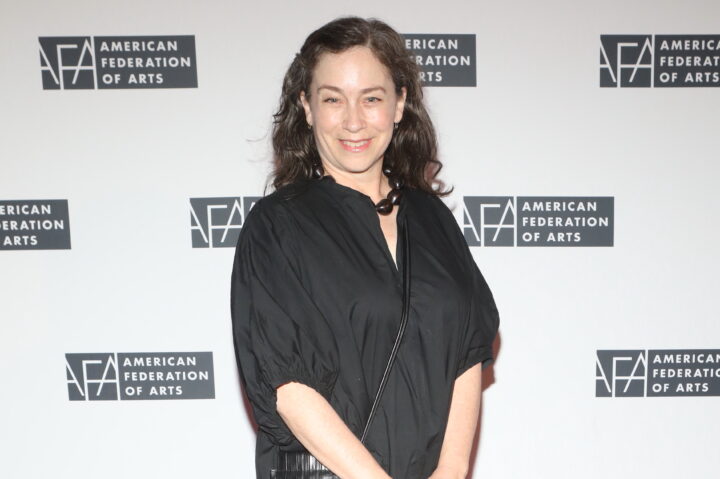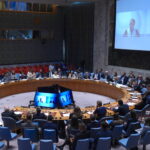The Democratic candidate for New York’s 17th Congressional District called the U.S. strikes on Iran ‘alarming and unprecedented’

Getty Images
Effie Phillips-Staley
Effie Phillips-Staley, running on a progressive platform in the crowded Democratic field looking to unseat Rep. Mike Lawler (R-NY) in a swing congressional district, is taking a firm stance against the U.S. and Israeli strikes on Iran’s nuclear program, even as she has expressed concern about Iran’s nuclear ambitions.
“For the leader of the free world to decide to strike Iran based on Fox News coverage and without deliberation or the approval of Congress is alarming and unprecedented,” she said in a statement to Jewish Insider on Monday, a position shared by many congressional Democrats. “We cannot have a nuclear armed Iran under any circumstances and Congress must hold this President accountable by upholding the War Powers Act and requiring a full diplomatic process.”
She also expressed concern in a statement following the initial Israeli strikes on Iran.
“I do not support a nuclear Iran under any circumstances and understand Israel must preserve its security as it faces near constant threat of attacks. I am also deeply troubled at the rush to war, especially as diplomacy was underway,” Phillips-Staley said. “It is not lost on me that Trump’s decision to carelessly destroy the JCPOA in his first term has now put the lives of countless people, including Israelis and Americans, at risk. Diplomacy must be given a chance. We must prioritize the safety of innocent civilians, American personnel and peace.”
Phillips-Staley, a Tarrytown, N.Y., village trustee who has made her career in the nonprofit world focused on issues including the Hispanic community, public schools and art, told JI in an interview last month that she sees an open lane in the race for an unabashed progressive.
“I looked at the field and felt strongly that there was a space for a progressive candidate in this field, and so I decided to enter,” she said.
She’s leaning on that progressive positioning to distinguish her from a field of nearly 10 Democrats, many of whom are staking out broadly moderate or center-left platforms. Despite her criticisms of the Iran strikes, Phillips-Staley has otherwise not embraced elements of the left-wing policy agenda that have alienated Jewish voters.
Phillips-Staley said she wanted to be “very clear that the U.S. has to continue to be a critical ally to Israel,” emphasizing that Israel remains under threat and “does, of course, have a right to exist and should continue to exist.”
She indicated that she would oppose additional conditions or restrictions on U.S. aid to the Jewish state, which she emphasized is critical to keeping Israel safe from existential threats.
But Phillips-Staley criticized Israeli Prime Minister Benjamin Netanyahu, whom she said had “repeatedly undermined” a two-state solution, while adding that Hamas cannot continue to rule Gaza.
She said she wants to see Congress work to “create incentives to find a peaceful resolution,” but emphasized that the hostages must first be released. Phillips-Staley said that her family’s El Salvadorian background helps her understand the damage that a “cycle of violence can do” and how difficult it can be to interrupt.
She described the Abraham Accords as a framework that could be built upon for Israeli-Palestinian peace.
Speaking to JI in the aftermath of the antisemitic attacks in Washington and Boulder, Colo., Phillips-Staley called rising antisemitism nationwide “deeply, deeply troubling and appalling.” She suggested that brokering Israeli-Palestinian peace would help tamp down on antisemitism domestically.
“Apart from what everybody says — ‘we need more education, we need to come together more’ — I think we really have to work very hard to find a resolution to the conflict between Israel and Palestine,” Phillips-Staley said. “Peace creates peace. And the terrifying thing is … what is spilling from that unresolved conflict is now making Jews in America under threat even more, which is entirely unacceptable.”
She said the U.S. also needs to crack down on acts of violence and provide more resources to address antisemitism in the country.
Asked about the increase of domestic antisemitism predating the war in Gaza, Phillips-Staley criticized the first Trump administration, saying it had enabled and emboldened a range of unacceptable behavior, including white nationalism.
She expressed hope that a new Congress and subsequently a new presidential administration could help to reverse those trends.
Citing her own immigrant family background, she also criticized the Trump administration for implementing immigration restrictions in the name of combating antisemitism, explaining, “anything that creates wedges, that undermines the openness of people coming together, I question as effective.”
Phillips-Staley told JI she’s running for Congress to continue what she characterized as a lifetime of service in the nonprofit sector and, later, public office. She added that as the daughter of an immigrant from El Salvador, she has close ties to the Lower Hudson Valley district’s Hispanic and immigrant communities. She said those communities had urged her to run for higher office.
She currently lags behind many of the other candidates in the 17th District race in fundraising, though she entered the race more recently than several other competitors. In the first six weeks of her campaign she only raised $52,000, loaning her campaign an additional $100,000. She ended the third quarter with $103,000 on hand.
“Effie’s campaign is people-powered and grassroots,” campaign spokesperson John Tomlin said in a statement. “She does not come to the table with a list of corporations, ultra-rich and Washington establishment figures to seed her operation. We have an active campaign and we are on target with our goals.”
Rockland County Legislator Beth Davidson said she raised $350,000 in the past quarter and $850,000 since the start of her campaign, while national security veteran Cait Conley reported raising $472,000 in the second quarter and more than $800,000 since launching her campaign, and nonprofit leader Jessica Reinmann raised $311,000 in the first quarter, $100,000 of that self-funded.
Phillips-Staley argued that her lived experience as a Hispanic person from a working-class background, who put herself through college and worked her way up from a receptionist to executive director of a nonprofit, makes her fairly unique among political candidates and leaders.
Her key issues as a member of Congress, she said, will be affordability, particularly in housing, and protecting government services that help Americans succeed. She said she’s proud of the work she’s done on issues like infrastructure and zoning in her role in local government.
Sherrill and Gottheimer are backing the definition after a leading rival, Steve Fulop, said he’d veto the bill

Kyle Mazza / SOPA Images/Sipa USA via AP Images
Jersey City Mayor Steve Fulop during a press conference in Jersey City.
New Jersey legislation codifying the International Holocaust Remembrance Alliance’s working definition of antisemitism is splitting the Democratic field in the gubernatorial race, after one leading candidate said last week he’d veto the bill.
Rep. Mikie Sherrill (D-NJ) told JI this week that she supported legislation under consideration in the state that would codify the IHRA definition as New Jersey’s official definition of antisemitism for assessing cases of antisemitic discrimination. “I’ve supported the IHRA definition in the U.S. House, and would support the current state Senate bill to combat the alarming rise of antisemitism in New Jersey,” Sherrill said in a statement to JI.
Rep. Josh Gottheimer’s (D-NJ) campaign indicated in a statement that he also supports the bill. His campaign manager, Chelsea Brossard, noted that he “helped write and pass” the Antisemitism Awareness Act, which codifies the IHRA definition at the Department of Education.
“Since October 7th, antisemitic incidents have skyrocketed to an all-time high in New Jersey. This is unacceptable, and Josh will continue working tirelessly at all levels of government to protect Jewish students and families from all forms of hate,” Brossard said.
Those comments come after Jersey City Mayor Steven Fulop, who has touted his Jewish heritage on the campaign trail, said he was opposed to the legislation, arguing that it could infringe on criticism of Israel and ultimately exacerbate antisemitism.
Three other candidates in the race — Newark Mayor Ras Baraka, New Jersey Education Association President Sean Spiller and former state Sen. Steve Sweeney — did not respond to requests for comment on the IHRA issue.
Fulop and Sherrill have both recently come under scrutiny for campaigning alongside progressive leaders who’ve been outspoken against Israel.
A Jewish leader in the state told JI that Fulop’s IHRA stance, in combination to his ties to anti-Israel figures including Sadaf Jaffer, an outspoken anti-Israel former state assembly member, have generated growing frustration and a sense of betrayal among members of the Jewish community.
Fulop aggressively rejected the notion that his IHRA stance was motivated by politics, and said his comments have been misconstrued by various constituencies. “What I said was a very thoughtful, careful, deliberate answer that serves very little political benefit because I answered it honestly,” Fulop told JI.
He said that, in the same comments about IHRA, he had supported the New Jersey-Israel Commission and anti-Boycott, Divestment and Sanctions legislation and said that Gov. Phil Murphy had not been aggressive enough in response to antisemitism on college campuses.
He also said Jaffer was only a campaign volunteer and that they don’t agree on all issues. “Anybody who says that I’m antisemitic or I don’t sympathize with the Jewish community is totally misguided, and they’re purely political.”
Another Jewish leader said that many Jewish politicos see Gottheimer’s record as the strongest on antisemitism and supporting Israel, but that without an aggressive advocacy effort highlighting the differences in the candidates’ records, the Jewish vote could end up split among various candidates, with voters prioritizing other issues.
A key political dynamic in the race is becoming the fight between New Jersey’s Democratic machine and those casting themselves as outsiders opposing that machine. Institutional support has largely been divided between Sherrill and Gottheimer, but some leaders who had initially backed Gottheimer recently switched their allegiance to Sherrill.
“Party leadership in New Jersey is a little bit scared,” Dan Cassino, the executive director of the Fairleigh Dickinson University poll, told JI. “There’s a strong incentive for that group, for institutional Democrats, to unify behind one candidate and make sure that candidate gets the nomination, to preserve at least the perception that they’re able to pick the candidates and therefore maintain their power.”
If Sherrill and Gottheimer split the moderate vote, one of the other candidates could muster enough support to achieve victory. No reliable polling is available in the race at this point.
Fulop and Baraka seemed to pick up momentum from strong performances in a recent debate and have been making strides in fundraising, Cassino added. In that debate, Sherrill appeared to be “riding the fence,” he continued, and avoiding controversial policy positions, while Gottheimer was on the receiving end of criticism from several other candidates.
As they’re trying to lock down a winning coalition, some candidates are trying to balance appealing to both left-wing constituencies critical of Israel and the state’s sizable Arab and Muslim populations, as well as the state’s significant Jewish population and the moderate voters they’ll need to win the general election.
Baraka’s candidacy could raise concerns in the Jewish community given that his father, poet Amiri Baraka, claimed in a 2002 poem that Israelis knew about the 9/11 attacks in advance. A Baraka-backed initiative in Newark held an event on Oct. 7, 2023, honoring the elder Baraka, which featured multiple speakers who have been accused of antisemitism. Baraka has defended his father from accusations of antisemitism.
A Jewish leader in the state said that Baraka’s base largely coincides with anti-Israel parts of the Democratic Party.
Sweeney, a moderate Democrat and the former senate president, supported anti-Boycott, Divestment and Sanctions legislation when he was in the state Senate and led legislation to combat antisemitism in schools in 2019 which largely utilized the IHRA definition. Hailing from southern New Jersey, his base of support is expected to come largely from that part of the state, potentially including some Jewish voters in the Cherry Hill area.
The Jewish leader said that Sweeney’s record on Jewish issues has been unobjectionable.
Spiller, the former mayor of Montclair, N.J., could face issues among Jewish voters in the state over concerns about antisemitism in New Jersey’s public schools, though he has offered condemnations of antisemitism in the past. He’s leaning into education issues on the trail. The Jewish leader described the teachers’ union as having a poor record on Israel issues.






























































